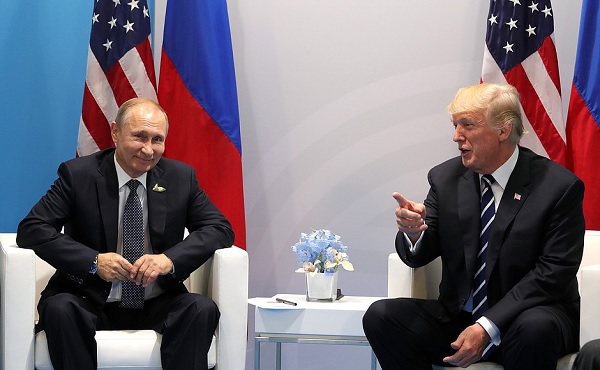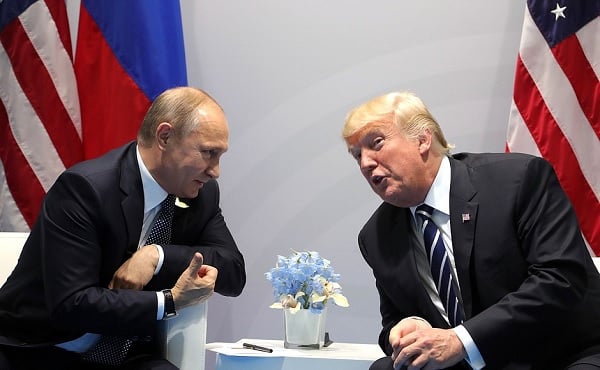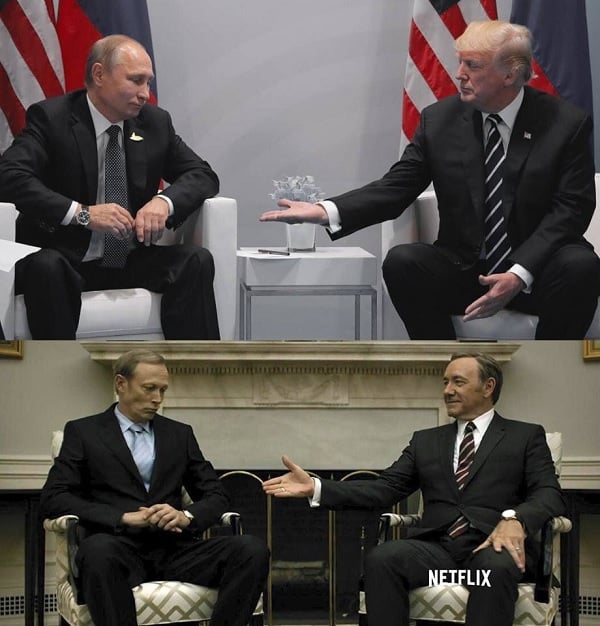
Vladimir Putin and Donald Trump meet at G20 Summit (Kremlin)
U.S. President Donald Trump met with Russian President Vladimir Putin July 7 on the sidelines of the Group of Twenty (G20) Summit in Hamburg, Germany. Intended to be a half-hour meeting, it went on for more than two hours. Present in addition to Trump and Putin were U.S. Secretary of State Rex Tillerson, Russian Foreign Minister Sergei Lavrov, and two translators. There were no note-takers or foreign policy experts representing the U.S. side, and the U.S. appeared to have done little in the way of preparation for the meeting.
Russia was pleased with the outcome of the meeting, reporting that Trump appeared to accept Putin’s denial on meddling in the 2016 U.S. presidential election. While the Trump administration insists that Trump did not believe Putin’s denial of election meddling, reviews of the meeting in the United States were not so good as in Russia. “The Russians just played the President,” former White House communications director and State Department spokeswoman Jen Psaki writes at CNN, highlighting the lack of preparation and foreign policy expertise on the U.S. side. “It was predictable. And [Trump] let it happen.”
Putin is, of course, a former intelligence officer who has led Russia alternately as president and prime minister for 18 years, and Lavrov is a seasoned diplomat with decades of experience. Trump and Tillerson, on the other hand, are political neophytes who have been in government for less than six months.
“The Trump-Putin bromance is back on,” writes John Cassidy at The New Yorker, and Putin appears to be the alpha-bro in the relationship. As Cassidy observes, Putin “got what he wanted from the meeting: a commitment from the U.S. to move on from the [2016 U.S. presidential] election controversy and normalize relations”; while Trump “could claim that he had raised the question of Russian interference [in the election], even if he did so only in the most perfunctory of fashions.” What the U.S. got other than superficial cover for Trump remains unclear.
“Trump handed Putin a stunning victory,” writes Molly McKew at Politico, “From his speech in Poland to his two-hour summit [with Putin] in Hamburg, the president seemed determined to promote Russia’s dark and illiberal view of the world.” As Anne Applebaum and Jonathan Capehart likewise note at The Washington Post, Trump’s speech in Warsaw seemed to affirm the authoritarian nationalism of the right-wing Polish government that gave Trump a “fawning reception” with government-sponsored “rent-a-crowds” bussed in from across the country. In what must have been music to Putin’s authoritarian ears, Trump’s speech contained no mention of democracy or human rights.
Then in Hamburg, Trump shared a chuckle at the expense of American news reporters with Putin, who is strongly suspected of having journalists and other critics killed in Russia. “Are these the ones who insulted you?” Putin asked, gesturing thuggishly at the reporters with his thumb as they were being ushered out of the room. “These are the ones,” Trump replied, chuckling with Putin, “You’re right about that.” Perhaps Trump also thinks that Putin is right in how he deals with troublesome journalists and political opponents (Recall that Trump once praised the Chinese government’s deadly crackdown on China’s 1989 democracy movement at Tiananmen Square as a “show of strength,” and called the peaceful democracy movement itself a “riot.”).

“Are these the ones who insulted you?” (Kremlin)
“The Russian-American relationship is no longer about Russia or America…,” writes Anne Applebaum at The Washington Post, “It is driven, rather, by the personal interests of the two main players,” Vladimir Putin and Donald Trump. Applebaum notes that there were “no aides, no advisers, no experts” present at the meeting and “nothing prepared in advance” to represent the interests of the American people. “Both [Putin and Trump] got what they wanted,” however: “Bragging rights for Putin; a new friend for Trump. As for the rest of us — it doesn’t matter what we think. In this relationship, only two people matter.”
Trump’s national security adviser, H.R. McMaster, had previously suggested as much when he said that there was “no specific agenda” for the meeting: “It’s really going to be whatever the president wants to talk about.” When have such important meetings between world leaders ever been about “whatever the president wants?” Just as the Russian presidency is all about Vladimir Putin, the U.S. presidency increasingly appears to be all about Donald Trump and his “absolute right” to do as he likes with the Russians or anyone else. No previous U.S. administration has spent as much time talking about the president’s “rights” and the president’s “unquestionable authority” as this administration has.
Despite the authoritarian tendencies Trump displays with his American critics, body language analysis indicated deference and supplication on Trump’s part with Putin and dominance on Putin’s part with Trump, clearly showing “who’s the boss” in the relationship between the two men. As Russia’s RT noted with pleasure, there was even a “House of Cards” moment, when Trump extended his hand to a haughty-looking Putin in a scene reminiscent of a meeting between fictional U.S. president Frank Underwood and Russian president Viktor Petrov in the Netflix series:

Putin-Trump House of Cards (Twitter)
If Trump hoped for a boost at home from his second overseas trip and first meeting with Putin as president, then he seems certain to be disappointed. If anything, the meeting with Putin has generated even greater suspicion regarding Trump’s strange fixation on cozying up with Russia.